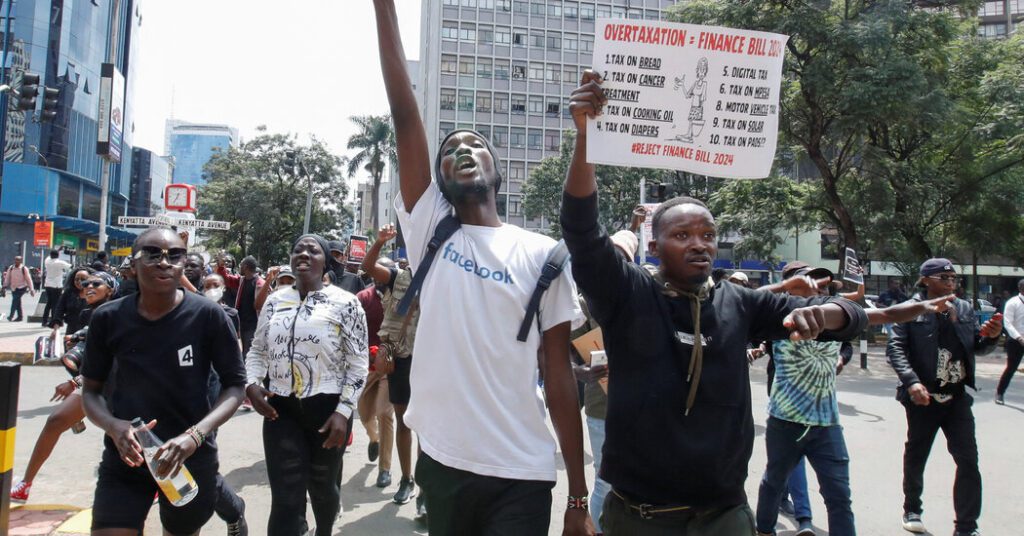Hundreds of people gathered in downtown Nairobi, Kenya's capital, on Tuesday to protest against a proposed finance bill that many fear will dramatically increase already high living costs by adding new taxes and raising levies on a wide range of goods and services.
Wearing black T-shirts and blowing whistles and vuvuzelas, protesters gathered near the parliament building and vented their anger online through hashtags and TikTok videos. Lawmakers have also been inundated with calls and text messages pressuring them to reject the bill.
Police used tear gas and water cannons against protesters and quickly began making arrests. At least nine people were seen being detained near the parliament building and loaded into police vehicles, and activists and lawyers said many more were in custody. Police have not yet said how many have been arrested.
Shops in the central business district closed as police pursued protesters and sirens rang out through the streets.
As protests rocked the city, the government announced it would scrap some of the new taxes, including on bread, a concession that opposition lawmakers dismissed as a “PR stunt.”
“The frustration has been building and now it's exploding,” said Hanifa Adan, a local activist and one of the protest organisers.
“We have been calling and texting our lawmakers to let them know that your loyalty is to our constituents and that we are against this bill,” she said. Adan said in a social media post that she was arrested by police just before Tuesday's protests began.
The bill, first introduced in Parliament last month, would introduce new taxes and levies that would increase the prices of goods such as bread, diapers and cars. It also raises import duties on goods, taxes on phone and internet data, and money transfer fees charged by banks and other financial services. It also increases taxes on companies and operators of digital businesses such as ride-hailing and food delivery services.
Ruto's parliamentary coalition, which holds a majority in Parliament, announced on Tuesday it would remove several measures, including the bread tax and excise duty on vegetable oil.
“We have listened to you,” Parliamentary Majority Leader Kimani Ichungwa told a news conference. “We have heard you.”
But the rollback of some of the measures did nothing to calm protesters who took to the streets of Nairobi, chanting “Repeal the Finance Bill, Repeal it” and “A united people will never be defeated.”
Opposition lawmakers have said they will not support the bill. Debate on the bill is due to begin on Wednesday.
“I call on all MPs to still vote against this draconian and oppressive finance bill,” said opposition lawmaker Babu Owino, who accused the government of withdrawing some of the proposals as a “PR stunt” and of being “out of touch” with the daily lives of ordinary Kenyans.
Treasury officials say the tax measures are crucial to raising revenue and limiting borrowing in an economy plagued by high debt.
But activists, economists and religious leaders say the tax hikes could discourage investment, stifle growth and make Kenya less competitive in East Africa. They also say the plan would hurt key industries such as manufacturing, transport and financial services.
“In a country facing fiscal challenges such as Kenya is currently facing, the debate about balancing debt settlement with economic growth is important,” said John Kinuthia, senior program officer at the nonprofit International Budget Partnership Kenya.
“But while governments look for new sources of funding, they also need to be mindful of the uproar these new measures will entail and their impact, particularly at the household level.”
Ruto, a wealthy businessman from a poor family, was elected on promises to improve the economy for millions of Kenyans struggling to make ends meet – promises that critics say have not been delivered.
His government raised the cost of health insurance and pension contributions for salaried workers. It eliminated fuel subsidies, introduced a housing tax and increased electricity prices. Experts say these measures, exacerbated by a severe drought that followed devastating floods, have led to job losses and factory closures.
The rising cost of living also sparked protests last year in which police killed at least 57 people, according to rights groups.
“It's one pain after another,” said Catherine Mueni Mutuku, a grocery shop owner in the capital, Nairobi, who said she was struggling to pay the rent for her shop and her house, as well as her children's high-school fees.
“The politicians have really oppressed us,” said Mutuku, who took part in Tuesday's protest. “It's like they don't feel our pain.”
Ruto has raised taxes and cut spending, his government has been plagued by a major corruption scandal and he has also come under fire on social media for his globetrotting trips and penchant for expensive shoes and watches. Many Kenyans call him “Zakayo” after the biblical tax collector Zacchaeus.
But despite all this, Mr Root, 57, has not only doubled down on his policies but has also pledged to raise taxes in the coming years. “I am not going to govern a bankrupt country,” he said last month. “We have to start living within our means.”
Over the past few days, Kenyans have been sharing contact details of lawmakers online, urging them to pressure voters to reject the bill, with lawmakers saying they have been inundated with messages and calls.
Adan, who organized the protest, said people from all political and economic walks of life were united in opposition to the bill, showing how dire the situation is across the country.
“Root and his policies have turned everyone into an activist,” she said. “This is not just a poor people's protest. This is everyone's protest.”

